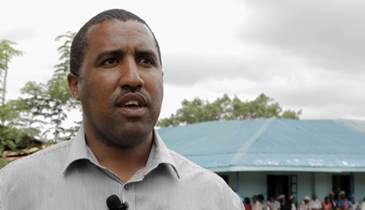Perfecting access through embedded sustainability, pooling resources and consolidating expertise (Guest blog)
15.06.16

I remember when I first really began to understand the necessity of access to medicines in my country, Kenya.
Back in 2000, I was a newly-qualified sales representative, the starting point for many people working in the pharma industry. One of the products I was promoting was an antimalarial. As it happened, there was a malaria outbreak raging in my sales territory, the Kisii district – doctors and nurses were overwhelmed, patients were four to a bed, and they had even run out of stands to hold drip bags – these were held up by patients and their families instead.
I was in a pharmacy talking to the pharmacist. An old lady came in and handed over a prescription. As the pharmacist told her the price for the drug, she shook her head sadly, and shuffled out the door. I followed her out and asked her why she did not buy the medicine. She explained it was an antimalarial for her grandson – the very same drug that I had been promoting to the pharmacist. The doctor had told her this would be the best medicine for him. But he was an orphan, she was his only carer, and she had no money to pay for the medicine. At that point I took her back into the pharmacy and paid for the medicine myself. But as I did it, I thought back to all those patients crammed into the wards, and realised that, while I could help one person, I couldn’t do it for everyone.
That was the start of my passion for working on affordable access programmes. These are a way for pharmaceutical organisations to use their influence and scale to really make a difference in countries where too many people cannot afford basic medicines. This is why I have helped launched and now run the Novartis Access programme in Kenya. It is a partnership with Kenyan health providers to provide high-quality treatments for non-communicable diseases (NCDs) in our country.
Many Europeans and Americans are surprised to learn that NCDs are soon likely to be killing more Africans than infectious diseases like HIV, TB and malaria. In fact, the World Health Organization (WHO) estimates that by 2030, the toll of NCDs will equal the toll of communicable diseases, maternal and newborn deaths, and malnutrition combined. This is partly good news: most of Africa has made remarkable progress in stopping deaths from infectious diseases, high-risk pregnancies and malnutrition. In part, though, as Africa becomes wealthier and more urbanised, Africans are becoming more sedentary, drinking and smoking more, and eating an unhealthy diet … sound familiar?
Many African governments recognise the threat and are trying to educate the public about the risks of unhealthy lifestyles – in Kenya, the government has a five-year strategy, which aims to achieve much higher public awareness around chronic diseases. While prevention is critical, though, the World Bank has stated that care and treatment of NCDs inevitably will become a much bigger part of African healthcare expenditure.*
Novartis Access is an operational innovation designed to tackle these health challenges, which will require pooling resources and expertise from all those involved in healthcare delivery. It provides governments, NGOs and other public-sector stakeholders access to a portfolio of 15 on- and off-patent medicines for the treatment of cardiovascular disease, diabetes, breast cancer and respiratory illnesses. The aim is to expand the portfolio over time to cover additional illnesses and provide better treatments for the ones we already target. Patients at village facilities in Kenya receive exactly the same treatments that are sold in western countries.
Novartis Access is different from some other access programmes because it has embedded sustainability at its core. We are planning for it to be commercially sustainable over the medium term, enabling continuous support. The fixed cost means health systems in the 30 lower-income countries where it will eventually be available can plan expenditure more predictably.
Here in Kenya we work in close partnership with the government and leading Christian groups providing healthcare services, including the Kenyan Conference of Catholic Bishops, the Christian Health Association of Kenya, and the Mission for Essential Drugs and Supplies. We make sure that the medicines we provide under Novartis Access meet the government’s priorities in fighting NCDs, and we are working closely with them to plan the roll-out of the programme across the public health system in Kenya. This is not just about supplying medicines – we have to ensure healthcare workers are trained in the proper diagnosis and treatment of NCDs. This is not an easy task in a health system where most doctors and nurses – understandably – have been trained mainly to diagnose and treat infectious diseases.
Novartis Access owes its strength to its partners – without whom it would be impossible to deliver the changes in care a country like Kenya needs. I am proud to be working on an initiative that I believe can really help my country meet the health challenges of the future.
